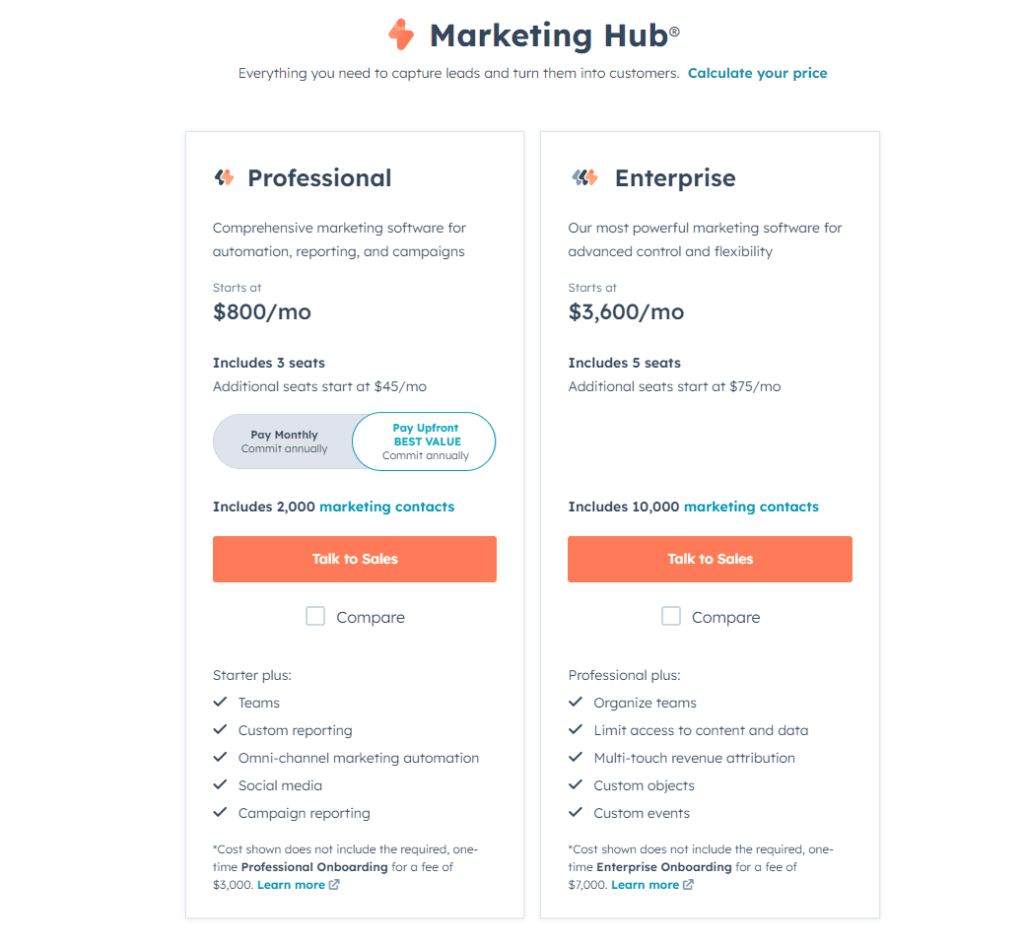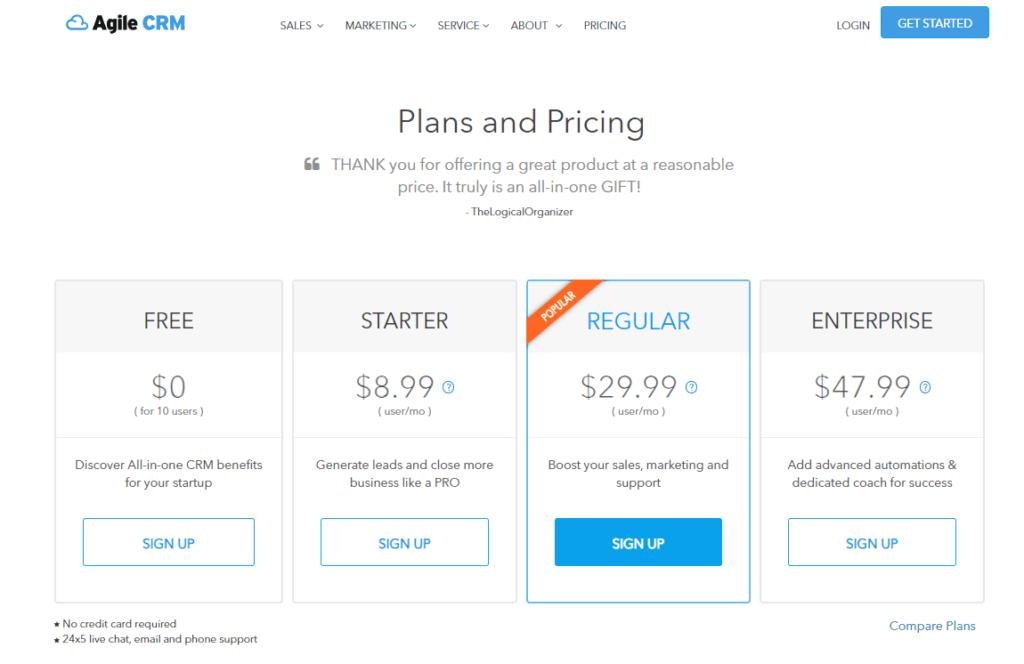In today’s fast-paced business world, the right Customer Relationship Management (CRM) tool isn’t just a luxury—it’s a necessity. With an ocean of options available, zeroing in on the perfect CRM can feel like searching for a beacon in the fog. Two standout candidates in this crowded field are HubSpot CRM and Agile CRM. Both platforms offer a suite of features designed to streamline your sales process, bolster customer relationships, and supercharge your marketing efforts. But when it comes down to the wire, which CRM is the best fit for your business’s unique rhythm? Let’s kick off this comparison.
| HubSpot CRM | Agile CRM |
|---|---|
 |  |
| G2 Score -4.4 out of 5 | G2 Score -4.0 out of 5 |
| TrustRadius Score -8.5 out of 10 | TrustRadius Score -7.5 out of 10 |
Ease of Use and User Experience
In the realm of CRM tools, where sophistication meets functionality, the ease of use and user experience (UX) play pivotal roles. A CRM should empower your team, not encumber them with complexity. Here’s how HubSpot CRM and Agile CRM stack up in this arena.
HubSpot CRM: Intuitive and Streamlined
HubSpot CRM is celebrated for its intuitive interface and streamlined user experience. Designed with clarity and simplicity in mind, it ensures businesses of all sizes can effortlessly navigate through its features from the get-go. Whether managing contacts, automating sales processes, or crafting marketing campaigns, HubSpot makes it seamless.
The platform excels in onboarding new users with guided tours, helpful prompts, and a wealth of resources, ensuring you’re well-equipped to leverage its full suite of features. The dashboard offers a clean, organized overview of your sales pipeline and marketing efforts, making it easy to grasp your business’s pulse at a glance.
Customization within HubSpot is straightforward, allowing teams to tailor the platform to their specific needs without deep technical expertise. Whether tweaking deal stages, setting up email templates, or creating custom reports, HubSpot’s interface keeps it simple and efficient.
Agile CRM: Comprehensive with a Learning Curve
Agile CRM positions itself as a comprehensive solution, offering a wide range of features beyond basic CRM functionalities, including sales enablement, marketing automation, and customer service tools. This extensive feature set, while powerful, introduces a steeper learning curve. New users might find the initial setup and navigation a bit more challenging compared to HubSpot’s straightforward approach.
However, Agile CRM is designed with customization and flexibility in mind. It offers detailed settings and options for tailoring the platform to fit intricate business processes. For teams willing to climb the learning curve, Agile CRM becomes a highly adaptable tool that can mold to various operational needs.
Pricing and Scalability
The right CRM should not only fit within your current budget but also grow alongside your business, accommodating increasing demands without breaking the bank. Here’s how both CRM solutions fare when it comes to affordability and their ability to scale with your business needs.
HubSpot CRM: A Scalable Solution with a Generous Start

HubSpot CRM is notable for its attractive starting point with a free version that’s robust enough for small businesses or startups to get going without any upfront investment. This free plan includes essential features such as contact management, email marketing, and deal pipelines, offering substantial value for businesses in the early stages of growth.
As your business expands and requires more sophisticated features, HubSpot’s pricing model scales with you. The platform is segmented into various “Hubs” (Sales, Marketing, Service, and CMS) each available in different tiers: Starter, Professional, and Enterprise. This allows businesses to customize their CRM ecosystem by adding more advanced functionalities as needed. The modular nature of HubSpot’s pricing ensures you pay for only what you use, but it’s worth noting that costs can escalate as you scale up and integrate multiple hubs.
Agile CRM: Affordable and Comprehensive for SMBs

Agile CRM offers a competitive pricing model designed with small to medium-sized businesses in mind. Starting with a free version for up to 10 users, Agile CRM provides basic CRM functionalities, making it an accessible option for very small businesses or those just beginning to explore CRM solutions.
Agile CRM’s paid plans are structured to accommodate growing businesses with increasing CRM needs. Each subsequent tier offers more in terms of user limits, features, and customization options, catering to businesses at various growth stages. Agile’s pricing model is straightforward, with clear upgrades as businesses require more sophisticated tools, including advanced marketing automation, sales tracking, and customer service features. Agile CRM aims to provide a comprehensive suite of tools without necessitating a significant jump in cost as businesses scale.
Integration Capabilities
In today’s interconnected digital ecosystem, a CRM’s ability to seamlessly integrate with other tools and platforms—ranging from email marketing services and social media platforms to customer service software and accounting systems—can significantly enhance operational efficiency and provide a more unified view of customer interactions.
HubSpot CRM: A Hub for All Your Tools
HubSpot CRM is renowned for its extensive integration capabilities, making it a central hub around which businesses can build their entire digital ecosystem. With an impressive App Marketplace, HubSpot offers hundreds of integrations across various categories, enabling businesses to connect with a wide array of tools and services effortlessly. Whether it’s integrating with email marketing platforms like Mailchimp, social media tools like Facebook and LinkedIn, customer service software like Zendesk, or accounting systems like QuickBooks, HubSpot likely has a solution.
These integrations are designed to be deep and functional, allowing for a seamless flow of information across platforms. This ensures that teams can access the data they need, when they need it, without the hassle of manual data entry or switching between multiple tools. Additionally, for businesses with unique needs, HubSpot provides APIs for developing custom integrations, further enhancing its flexibility and utility as the centerpiece of your tech stack.
Agile CRM: Streamlined Integrations for Efficiency
Agile CRM also boasts strong integration capabilities, with a focus on providing seamless connections to enhance sales, marketing, and customer service processes. Agile offers integrations with major email providers, telephony services for sales calls, social media platforms for social CRM, and web services like Zapier for connecting with hundreds of other apps. This allows businesses to automate workflows and ensure that customer data flows smoothly across different channels and tools.
While Agile’s list of native integrations may not be as extensive as HubSpot’s, it covers the essential tools that small to medium-sized businesses typically use. Moreover, Agile’s API access in higher-tier plans enables further customization and integration with other systems, offering businesses the ability to tailor the CRM to their specific operational needs.

At DMR.agency, we rely on HubSpot CRM to streamline our client relationship management efforts and drive meaningful interactions with our audience. Here’s why we swear by it:
1. Comprehensive Functionality: HubSpot CRM offers a comprehensive suite of features, including contact management, email tracking, task automation, and detailed analytics. Its seamless integration with other HubSpot tools enhances efficiency and facilitates a holistic approach to customer engagement.
2. User-Friendly Interface: The intuitive interface of HubSpot CRM simplifies navigation and enhances user adoption across our team. From organizing contacts to creating personalized email campaigns, it empowers us to execute our CRM strategies seamlessly.
3. Marketing Integration: One standout feature of HubSpot CRM is its integration with the HubSpot Marketing Hub. This integration enables us to leverage rich customer data for targeted marketing campaigns, ensuring a cohesive and personalized brand experience across channels.
4. Sales Pipeline Management: HubSpot CRM’s robust sales pipeline management capabilities allow us to track leads, monitor deal stages, and forecast revenue with ease. Its customizable dashboards provide real-time insights into sales performance, empowering us to make data-driven decisions.
5. Automation and Workflows: Leveraging HubSpot CRM’s automation and workflow functionalities, we automate repetitive tasks, nurture leads, and streamline our sales and marketing processes. This not only saves time but also ensures consistency and efficiency in our interactions with prospects and clients.
6. Customer Support: HubSpot’s excellent customer support and extensive knowledge base further enhance our experience with the platform. Whether we encounter technical issues or seek guidance on best practices, their responsive support team is always ready to assist.
In terms of specific use cases, HubSpot CRM excels in email marketing integration. Its seamless synchronization with the HubSpot Marketing Hub enables us to create targeted email campaigns based on customer behavior and engagement metrics. This integration facilitates personalized communication and enhances the effectiveness of our email marketing initiatives.
Hamna Amjad, Project Manager of DMR agency
Marketing Automation
The capacity of a CRM to not only manage relationships but also to automate and optimize marketing efforts can significantly impact a business’s ability to attract, engage, and convert leads efficiently.
HubSpot CRM: Seamless Marketing Automation
HubSpot CRM excels in marketing automation, providing a seamless, integrated approach that aligns closely with inbound marketing methodologies. The platform offers a wide range of automation tools designed to nurture leads through personalized email marketing campaigns, social media management, and content marketing strategies. HubSpot’s strength lies in its ability to automate the entire marketing funnel, from attracting leads with engaging content to converting them with personalized communication based on user behavior and preferences.
One of HubSpot CRM’s standout features is its intuitive workflow creator, which allows businesses to easily set up automated sequences that trigger based on specific actions or criteria. This enables the creation of highly targeted campaigns that speak directly to the needs and interests of each lead or customer. Additionally, HubSpot provides detailed analytics and reporting tools, enabling businesses to measure the effectiveness of their marketing efforts and adjust strategies for optimal results.
Agile CRM: Comprehensive Tools for Automated Engagement
Agile CRM also offers robust marketing automation features, with tools designed to automate engagement across multiple channels. Agile CRM’s platform includes capabilities for email marketing, web pop-ups, landing pages, and social media marketing, allowing businesses to create a cohesive and automated marketing strategy. Similar to HubSpot, Agile enables the automation of workflows and campaigns, though with a focus that extends to integrating sales and service processes for a unified customer experience.
Agile CRM stands out for its flexibility in campaign creation and segmentation, enabling businesses to tailor their messaging and outreach based on detailed customer profiles and interaction histories. This ensures that marketing efforts are both targeted and relevant. Additionally, Agile offers visual analytics and reporting features, providing insights into campaign performance and customer behaviors.

Related: Check out our free SEO suite

Customer Support and Training
The level and quality of support provided by a CRM vendor, along with the training resources available to help you maximize the platform, can greatly influence your overall satisfaction and success with the CRM.
HubSpot CRM: Unmatched Support and Educational Resources
HubSpot CRM sets the bar high with its commitment to customer support and education. Users have access to a comprehensive range of support options, including email, phone, and live chat, ensuring that help is readily available when needed. This is complemented by HubSpot Academy, an extensive online learning platform offering free courses, certifications, and training materials on a wide array of topics related to sales, marketing, customer service, and CRM best practices.
The Academy’s resources are designed not only to help users get the most out of HubSpot’s tools but also to enhance their overall business acumen. This commitment to user education and support is a cornerstone of HubSpot’s offering, ensuring businesses have the knowledge and resources to grow and succeed.
Agile CRM: Effective Support with Focused Training Resources
Agile CRM also provides solid customer support, with email and live chat options available to users across all plans. Higher-tier plans unlock additional support channels, including phone support, ensuring that businesses can choose the level of support that best fits their needs. While Agile’s support system is effective, it may not match the breadth of options provided by HubSpot.
In terms of training resources, Agile CRM offers a collection of online tutorials, documentation, and webinars designed to help users understand and utilize the platform’s features. These resources are focused and practical, aimed at enabling quick mastery of Agile’s tools for sales, marketing, and service automation. While Agile’s educational offerings are valuable, they don’t cover as broad a range of topics as HubSpot Academy.
Conclusion
Concluding our in-depth comparison between HubSpot CRM and Agile CRM, we’ve navigated through several key areas that are pivotal when selecting the right CRM tool for your business. From ease of use and user experience, pricing and scalability, to integration capabilities, and customer support and training, both platforms present unique strengths tailored to different business needs and preferences.
READ NEXT:
- HubSpot CRM vs Insightly CRM: The Best CRM Tool for You
- Looker vs MonsterInsights: The Best Marketing Analytics Tool for You
- Creating a Content Calendar: Organizing for Consistency and Impact
- HubSpot CRM vs Nimble CRM: The Best CRM Tool for You
- Impact Of GDPR On Marketers in EU and Outside
- 9 Best Marketing CRM Software (For You): In 2023
- 19+ Top Customer Relationship Management (CRM) Software: What’s Best?






















Comments are closed.